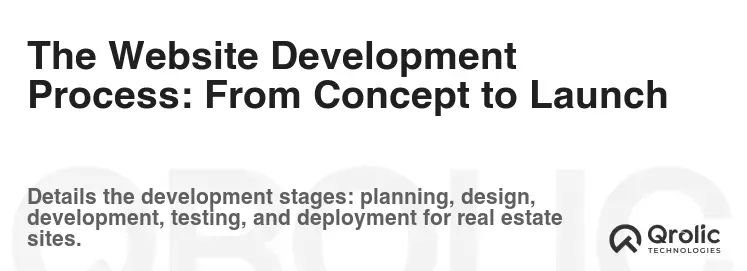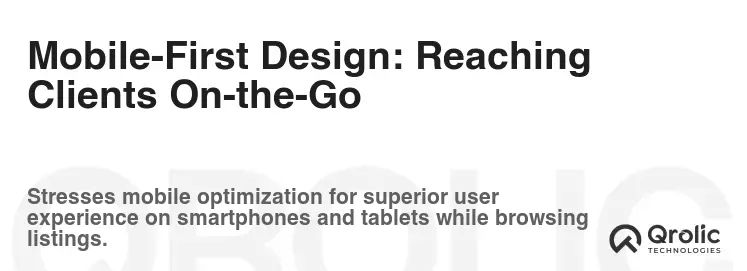The real estate landscape is changing, and if your agency isn’t online with a powerful, user-friendly website, you’re losing deals. Period. This isn’t just about having a digital brochure; it’s about building a virtual storefront that attracts clients, showcases properties, and closes deals 24/7. This comprehensive guide delves into everything you need to know about real estate website development, property agency web design, and securing the best realty website services.
Quick Summary:
- A strong website is vital for real estate success.
- Include powerful listings, lead tools, and friendly design.
- Optimize for mobile, search engines, and fresh content.
- Partner with experts for best real estate web services.
Table of Contents
- Why Your Real Estate Agency Needs a Killer Website (Now!)
- Essential Features of a Winning Real Estate Website: The Building Blocks of Success
- 1. Property Listings: The Heart of Your Website
- 2. User-Friendly Design and Navigation: The Key to Engagement
- 3. Lead Generation Tools: Turning Visitors into Clients
- 4. Content and Resources: Establishing Authority and Providing Value
- 5. Search Engine Optimization (SEO): Getting Found Online
- The Website Development Process: From Concept to Launch
- 1. Planning and Discovery: Defining Your Goals
- 2. Design and Development: Bringing Your Vision to Life
- 3. Content Creation and Population: Filling Your Website with Value
- 4. Testing and Launch: Ensuring a Smooth Start
- 5. Marketing and Promotion: Driving Traffic and Generating Leads
- 6. Maintenance and Updates: Keeping Your Website Fresh and Relevant
- Choosing the Right Technology: The Foundation of Your Digital Presence
- Mobile-First Design: Reaching Clients On-the-Go
- Budgeting for Your Real Estate Website: Investing in Your Future
- Examples of Successful Real Estate Websites: Inspiration and Best Practices
- The Future of Real Estate Websites: Trends to Watch
- Qrolic Technologies: Your Partner in Real Estate Website Success
- Conclusion: Your Website – The Key to Real Estate Success
Why Your Real Estate Agency Needs a Killer Website (Now!)

Forget Yellow Pages and newspaper ads. Today’s buyers and sellers start their journey online. A robust website isn’t an option; it’s the foundation of your modern real estate business. Here’s why:
- 24/7 Lead Generation: Your website is always working, generating leads even while you sleep. Imagine waking up to a inbox full of potential buyers ready to view properties.
- Showcase Properties Effectively: High-quality photos, virtual tours, detailed descriptions – your website lets you present properties in their best light, reaching a global audience.
- Establish Credibility and Trust: A professionally designed website builds trust and authority. It shows you’re serious, tech-savvy, and invested in providing a top-notch experience.
- Targeted Marketing: Use your website to implement targeted marketing campaigns, attracting specific buyers and sellers based on their needs and location.
- Competitive Advantage: Stand out from the competition with a website that offers superior functionality, user experience, and valuable information.
- Simplified Communication: Integrated contact forms, chatbots, and live chat features make it easy for clients to connect with you instantly.
- Data-Driven Insights: Track website traffic, user behavior, and lead generation to optimize your marketing efforts and improve your ROI.
- Reduced Operational Costs: Automate tasks like property inquiries and appointment scheduling, freeing up your time and resources to focus on core business activities.
- Improved Customer Service: Provide resources like FAQs, neighborhood guides, and mortgage calculators to empower clients and enhance their experience.
- Branding and Recognition: A well-designed website reinforces your brand identity, creating a consistent and memorable experience for visitors.
Essential Features of a Winning Real Estate Website: The Building Blocks of Success

A stunning design is important, but it’s the functionality that truly separates a good real estate website from a great one. Here’s a checklist of must-have features:
1. Property Listings: The Heart of Your Website
- Advanced Search Filters: Allow users to search by location, price, property type, bedrooms, bathrooms, square footage, keywords, and more. The more filters, the better.
- High-Quality Photos and Videos: Showcase each property with professional-grade photos and engaging video tours. Consider using drone footage for aerial views.
- Detailed Property Descriptions: Provide comprehensive information about each property, including features, amenities, neighborhood details, and nearby schools.
- Interactive Maps: Integrate Google Maps or similar mapping services to show property locations, nearby points of interest, and neighborhood boundaries.
- Virtual Tours: Offer 3D virtual tours to allow potential buyers to explore properties remotely. This saves time for both you and your clients.
- Property Comparison Tool: Enable users to compare multiple properties side-by-side based on key features and criteria.
- Save and Share Functionality: Allow users to save their favorite properties and share them with friends, family, or colleagues.
- Print-Friendly Listings: Provide a printer-friendly version of each listing for easy offline viewing.
- Featured Listings: Highlight your most attractive or profitable properties to give them maximum visibility.
- New Listings Alerts: Allow users to sign up for email alerts when new properties matching their criteria are listed.
2. User-Friendly Design and Navigation: The Key to Engagement
- Intuitive Navigation: Make it easy for users to find what they’re looking for with clear and concise navigation menus.
- Mobile-Responsive Design: Ensure your website looks and functions flawlessly on all devices, including smartphones, tablets, and desktops.
- Fast Loading Speed: Optimize your website for speed to prevent users from abandoning your site due to slow loading times.
- Clean and Modern Design: Use a visually appealing design that is easy on the eyes and reflects your brand identity.
- Clear Call-to-Actions: Encourage users to take action with prominent call-to-action buttons, such as “Schedule a Showing,” “Contact Us,” or “Get a Free Consultation.”
- Accessibility: Ensure your website is accessible to users with disabilities by following accessibility guidelines.
- Interactive Elements: Use interactive elements, such as sliders, carousels, and animations, to enhance the user experience.
- User Accounts: Allow users to create accounts to save their favorite properties, track their searches, and manage their preferences.
- Testimonials and Reviews: Showcase positive testimonials and reviews from satisfied clients to build trust and credibility.
- Blog: Create a blog to share valuable real estate content, such as market updates, buying and selling tips, and neighborhood guides.
3. Lead Generation Tools: Turning Visitors into Clients
- Contact Forms: Implement strategically placed contact forms throughout your website to capture leads.
- Landing Pages: Create dedicated landing pages for specific marketing campaigns to increase conversion rates.
- Chatbots: Use chatbots to provide instant answers to common questions and qualify leads.
- Live Chat: Offer live chat support to provide real-time assistance to website visitors.
- Lead Magnets: Offer valuable resources, such as free ebooks, checklists, or guides, in exchange for contact information.
- Email Marketing Integration: Integrate your website with your email marketing platform to automate follow-up and nurture leads.
- CRM Integration: Integrate your website with your CRM system to manage leads and track your sales pipeline.
- Appointment Scheduling: Allow users to schedule appointments online with your agents.
- Property Valuation Tool: Offer a free property valuation tool to attract potential sellers.
- Newsletter Signup: Encourage users to subscribe to your newsletter for updates and exclusive content.
4. Content and Resources: Establishing Authority and Providing Value
- Neighborhood Guides: Create detailed guides to local neighborhoods, highlighting key features, amenities, and points of interest.
- Market Reports: Provide up-to-date market reports and statistics to inform buyers and sellers.
- Buying and Selling Guides: Offer comprehensive guides to the buying and selling process, answering common questions and providing valuable tips.
- Mortgage Calculator: Integrate a mortgage calculator to help users estimate their monthly payments.
- FAQ Section: Create a comprehensive FAQ section to answer common questions about real estate.
- Blog Posts: Regularly publish blog posts on relevant topics, such as home improvement tips, interior design trends, and real estate news.
- Glossary of Terms: Provide a glossary of real estate terms to help users understand industry jargon.
- Agent Bios: Feature your agents with detailed bios, photos, and contact information.
- Testimonials: Include testimonials from satisfied clients to build trust and credibility.
- Case Studies: Showcase successful real estate transactions to demonstrate your expertise.
5. Search Engine Optimization (SEO): Getting Found Online
- Keyword Research: Conduct thorough keyword research to identify the terms that potential buyers and sellers are using to find real estate online. (Think “real estate website development,” “property agency web design,” and “realty website services“!)
- On-Page Optimization: Optimize your website’s content, meta tags, and headers with relevant keywords.
- Off-Page Optimization: Build backlinks from high-quality websites to improve your website’s authority.
- Technical SEO: Ensure your website is technically sound, with a fast loading speed, mobile-responsive design, and proper site structure.
- Local SEO: Optimize your website for local search to attract buyers and sellers in your area. Claim your Google My Business listing and encourage clients to leave reviews.
- Content Marketing: Create valuable and informative content that attracts links and shares.
- Image Optimization: Optimize your images for search engines by using descriptive file names and alt tags.
- Schema Markup: Implement schema markup to help search engines understand the content of your website.
- Analytics Tracking: Track your website’s traffic, user behavior, and search engine rankings to measure your SEO performance.
- Regular Monitoring and Updates: Continuously monitor your website’s SEO performance and make updates as needed to maintain your rankings.
The Website Development Process: From Concept to Launch

Building a successful real estate website involves a series of carefully planned steps. Here’s a breakdown of the process:
1. Planning and Discovery: Defining Your Goals
- Define Your Target Audience: Who are you trying to reach? First-time homebuyers? Luxury property investors? Understanding your target audience will inform your design and content strategy.
- Identify Your Goals: What do you want your website to achieve? Generate leads? Showcase properties? Build brand awareness?
- Competitive Analysis: Research your competitors to identify their strengths and weaknesses. What are they doing well? What could they be doing better?
- Sitemap Creation: Create a sitemap to outline the structure and organization of your website.
- Content Planning: Plan the content that you will include on your website, including property listings, neighborhood guides, blog posts, and agent bios.
- Feature Prioritization: Determine which features are essential for your website and which features can be added later.
- Budget Allocation: Determine your budget for website development, design, and marketing.
- Timeline Establishment: Set a realistic timeline for the development and launch of your website.
- Technology Selection: Choose the technology platform, content management system (CMS), and plugins that you will use to build your website.
- Domain Name Registration: Register a domain name that is relevant to your business and easy to remember.
2. Design and Development: Bringing Your Vision to Life
- Wireframing: Create wireframes to visualize the layout and functionality of each page on your website.
- Design Mockups: Develop design mockups to showcase the visual appearance of your website.
- Front-End Development: Develop the front-end of your website, including the HTML, CSS, and JavaScript code.
- Back-End Development: Develop the back-end of your website, including the server-side logic and database integration.
- CMS Integration: Integrate your website with a content management system (CMS) to allow you to easily manage and update your content.
- Plugin Installation: Install and configure plugins to add functionality to your website.
- Mobile Optimization: Ensure your website is optimized for mobile devices.
- Testing and Quality Assurance: Thoroughly test your website to identify and fix any bugs or errors.
- Performance Optimization: Optimize your website for speed and performance.
- Security Implementation: Implement security measures to protect your website from hackers and malware.
3. Content Creation and Population: Filling Your Website with Value
- Property Listing Creation: Create detailed property listings with high-quality photos, virtual tours, and comprehensive descriptions.
- Neighborhood Guide Development: Develop detailed guides to local neighborhoods, highlighting key features, amenities, and points of interest.
- Blog Post Writing: Write regular blog posts on relevant topics, such as home improvement tips, interior design trends, and real estate news.
- Agent Bio Creation: Create detailed agent bios with photos, contact information, and areas of expertise.
- Testimonial Gathering: Gather testimonials from satisfied clients to build trust and credibility.
- Image and Video Upload: Upload high-quality images and videos to enhance your website’s visual appeal.
- Content Editing and Proofreading: Carefully edit and proofread all content to ensure accuracy and clarity.
- SEO Optimization: Optimize your content for search engines by using relevant keywords and phrases.
- Internal Linking: Link to other relevant pages on your website to improve SEO and user experience.
- Call-to-Action Implementation: Implement clear and compelling call-to-actions to encourage users to take action.
4. Testing and Launch: Ensuring a Smooth Start
- Cross-Browser Testing: Test your website on different browsers (Chrome, Firefox, Safari, etc.) to ensure compatibility.
- Cross-Device Testing: Test your website on different devices (desktop, laptop, tablet, smartphone) to ensure responsiveness.
- Usability Testing: Conduct usability testing with real users to identify any areas for improvement.
- Performance Testing: Test your website’s speed and performance under different load conditions.
- Security Testing: Conduct security testing to identify and fix any vulnerabilities.
- SEO Audit: Perform an SEO audit to ensure your website is properly optimized for search engines.
- Content Review: Review all content to ensure accuracy, clarity, and consistency.
- Backup and Restore: Create a backup of your website before launching it.
- DNS Propagation: Update your DNS records to point to your new website.
- Launch Announcement: Announce the launch of your website to your target audience.
5. Marketing and Promotion: Driving Traffic and Generating Leads
- Search Engine Optimization (SEO): Optimize your website for search engines to improve your rankings and attract organic traffic.
- Social Media Marketing: Promote your website and property listings on social media platforms.
- Email Marketing: Build an email list and send out regular newsletters and updates.
- Pay-Per-Click (PPC) Advertising: Run paid advertising campaigns on search engines and social media platforms.
- Content Marketing: Create valuable and informative content that attracts links and shares.
- Local SEO: Optimize your website for local search to attract buyers and sellers in your area.
- Online Directories: List your website in online directories and industry-specific websites.
- Partnerships: Partner with other businesses and organizations to promote your website.
- Public Relations: Reach out to media outlets and bloggers to get coverage for your website.
- Analytics Tracking: Track your website’s traffic, user behavior, and lead generation to measure your marketing performance.
6. Maintenance and Updates: Keeping Your Website Fresh and Relevant
- Regular Content Updates: Keep your website fresh and relevant by adding new property listings, blog posts, and neighborhood guides.
- Security Updates: Install security updates to protect your website from hackers and malware.
- Plugin Updates: Update your plugins to ensure compatibility and security.
- Performance Monitoring: Monitor your website’s speed and performance to identify any issues.
- SEO Monitoring: Monitor your website’s SEO performance to identify opportunities for improvement.
- User Feedback: Collect user feedback and make improvements to your website based on their suggestions.
- Technology Upgrades: Upgrade your website’s technology platform as needed to stay current.
- Design Refresh: Refresh your website’s design periodically to keep it modern and appealing.
- Backup and Restore: Regularly back up your website to protect your data.
- Disaster Recovery Plan: Develop a disaster recovery plan to ensure your website can be quickly restored in the event of a failure.
Choosing the Right Technology: The Foundation of Your Digital Presence

Selecting the right platform for your real estate website is crucial. Here are some popular options:
- wordpress: A versatile and widely used CMS, perfect for real estate websites due to its flexibility and extensive plugin library.
- Squarespace: A user-friendly platform with a focus on design, ideal for agencies seeking a visually appealing website with minimal technical expertise.
- Wix: Another drag-and-drop website builder, offering a wide range of templates and customization options.
- Custom Development: For agencies with unique requirements, custom development offers the most flexibility and control, but it’s also the most expensive option.
Key Considerations When Choosing a Platform:
- Ease of Use: How easy is it to manage and update your website’s content?
- Scalability: Can the platform handle your growing business needs?
- SEO Friendliness: Is the platform optimized for search engines?
- Plugin/Extension Availability: Does the platform offer the plugins and extensions you need to add functionality to your website?
- Security: How secure is the platform?
- Cost: What are the upfront and ongoing costs of using the platform?
Mobile-First Design: Reaching Clients On-the-Go

In today’s mobile-dominated world, a mobile-first approach is non-negotiable. Your website must be responsive and provide a seamless experience on all devices. Here’s what to consider:
- Responsive Design: Ensure your website automatically adapts to different screen sizes.
- Fast Loading Speed: Optimize your website for speed on mobile devices.
- Simplified Navigation: Use a clear and concise navigation menu that is easy to use on mobile devices.
- Touch-Friendly Design: Design your website with touchscreens in mind.
- Mobile-Specific Features: Consider adding mobile-specific features, such as click-to-call buttons and location-based search.
- Mobile Testing: Thoroughly test your website on different mobile devices to ensure it functions correctly.
- Mobile Analytics: Track your website’s performance on mobile devices to identify areas for improvement.
- AMP (Accelerated Mobile Pages): Consider implementing AMP to improve your website’s loading speed on mobile devices.
- Progressive Web App (PWA): Explore the possibility of turning your website into a PWA for an app-like experience on mobile devices.
- Mobile-First Content: Create content that is optimized for mobile devices.
Budgeting for Your Real Estate Website: Investing in Your Future

The cost of developing a real estate website can vary widely depending on the scope of the project, the platform used, and the features included. Here’s a general guideline:
- DIY Website Builders (Wix, Squarespace): $10-$50 per month
- WordPress with a Premium Theme: $500-$5,000
- Custom WordPress Development: $5,000-$20,000+
- Custom Website Development: $20,000+
Factors Affecting Cost:
- Design Complexity: More complex designs require more time and expertise.
- Functionality: The more features you need, the higher the cost.
- Content Creation: Creating high-quality content can be time-consuming and expensive.
- SEO Services: optimizing your website for search engines requires ongoing effort and investment.
- Maintenance and Support: Ongoing maintenance and support can add to the overall cost.
Tips for Staying Within Budget:
- Define Your Needs: Clearly define your needs and prioritize features.
- Shop Around: Get quotes from multiple developers and designers.
- Use a Template: Consider using a pre-designed template to save time and money.
- Negotiate: Don’t be afraid to negotiate prices.
- Start Small: Start with a basic website and add features later as needed.
- DIY Options: Consider using DIY website builders for basic websites.
- Open-Source Solutions: Opt for open-source platforms to reduce licensing costs.
- Freelance Developers: Hire freelance developers for specific tasks.
- Content Strategy: Plan your content strategy in advance to avoid costly revisions.
Examples of Successful Real Estate Websites: Inspiration and Best Practices

Looking at successful real estate websites can provide valuable inspiration. Here are some examples:
- Compass: Known for its sleek design, user-friendly interface, and advanced search filters.
- Sotheby’s International Realty: Showcases luxury properties with stunning visuals and detailed descriptions.
- Zillow: A comprehensive platform offering property listings, market data, and mortgage information.
- Redfin: A tech-driven brokerage with a focus on data analysis and customer service.
Key Takeaways from Successful Websites:
- High-Quality Visuals: Use professional-grade photos and videos to showcase properties in their best light.
- User-Friendly Navigation: Make it easy for users to find what they’re looking for.
- Advanced Search Filters: Allow users to search by a variety of criteria.
- Detailed Property Information: Provide comprehensive information about each property.
- Mobile-Responsive Design: Ensure your website looks and functions flawlessly on all devices.
- Strong Call-to-Actions: Encourage users to take action.
- Valuable Content: Provide valuable content, such as neighborhood guides and market reports.
- SEO Optimization: Optimize your website for search engines.
- Social Media Integration: Integrate your website with social media platforms.
- Customer Service: Provide excellent customer service.
The Future of Real Estate Websites: Trends to Watch

The real estate industry is constantly evolving, and so are the technologies used to market properties online. Here are some trends to watch:
- Artificial Intelligence (AI): AI-powered chatbots, virtual assistants, and personalized recommendations are becoming increasingly common.
- Virtual Reality (VR): VR tours are providing immersive experiences for potential buyers.
- Augmented Reality (AR): AR apps are allowing users to visualize how furniture would look in a property.
- Blockchain Technology: Blockchain is being used to streamline real estate transactions and increase transparency.
- Big Data Analytics: Big data is being used to analyze market trends and identify investment opportunities.
- Personalized Experiences: Websites are becoming more personalized, offering customized content and recommendations based on user behavior.
- Voice Search: Voice search is becoming increasingly popular, so it’s important to optimize your website for voice queries.
- Video Marketing: Video is becoming an increasingly important part of real estate marketing.
- Sustainability: Sustainable real estate practices are gaining traction.
- Smart Home Technology: Smart home features are becoming increasingly popular.
Qrolic Technologies: Your Partner in Real Estate Website Success

At Qrolic Technologies (https://qrolic.com/), we understand the unique challenges and opportunities of the real estate industry. We offer a comprehensive suite of realty website services, including property agency web design and real estate website development, to help you build a powerful online presence and achieve your business goals.
Our team of experienced designers, developers, and marketers will work closely with you to create a custom website that reflects your brand, showcases your properties, and generates leads. We specialize in:
- Custom Website Design: We create visually appealing and user-friendly websites that reflect your brand identity.
- Responsive Website Development: We ensure your website looks and functions flawlessly on all devices.
- SEO Optimization: We optimize your website for search engines to improve your rankings and attract organic traffic.
- Content Creation: We create high-quality content that engages visitors and drives conversions.
- Lead Generation Tools: We implement lead generation tools to capture leads and grow your business.
- Ongoing Maintenance and Support: We provide ongoing maintenance and support to ensure your website stays up-to-date and secure.
Why Choose Qrolic Technologies?
- Industry Expertise: We have extensive experience working with real estate agencies of all sizes.
- Custom Solutions: We tailor our solutions to meet your specific needs and goals.
- Results-Driven Approach: We are committed to delivering measurable results.
- Exceptional Customer Service: We provide exceptional customer service and support.
- Affordable Pricing: We offer competitive pricing and flexible payment options.
Let Qrolic Technologies help you build a digital empire for your real estate agency. Contact us today for a free consultation!
Conclusion: Your Website – The Key to Real Estate Success

In today’s digital age, a well-designed and optimized website is essential for success in the real estate industry. By implementing the strategies and tips outlined in this guide, you can create a website that attracts clients, showcases properties, and closes deals. Remember to focus on user experience, SEO, mobile-friendliness, and valuable content. Partner with a reputable realty website services provider like Qrolic Technologies to ensure your website is built to last and delivers the results you need. The time to invest in your online presence is now. Your digital empire awaits.









